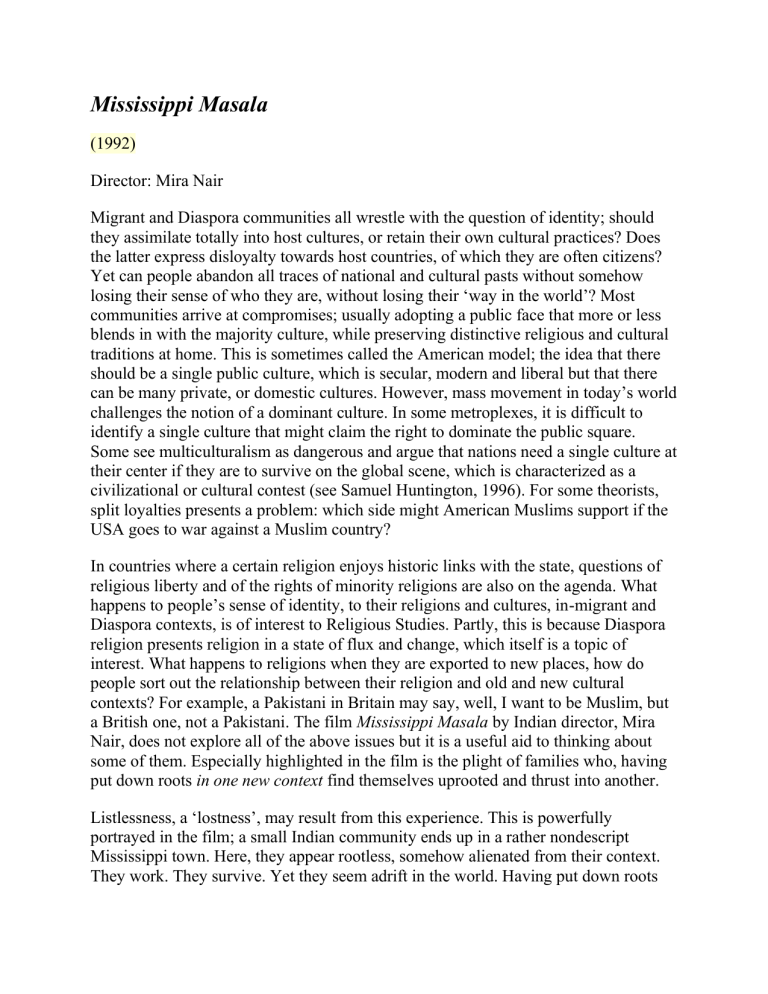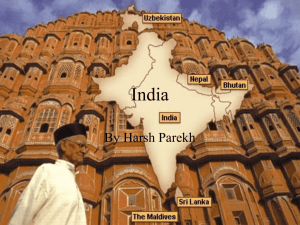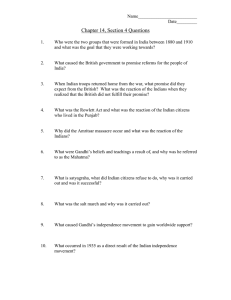
Mississippi Masala (1992) Director: Mira Nair Migrant and Diaspora communities all wrestle with the question of identity; should they assimilate totally into host cultures, or retain their own cultural practices? Does the latter express disloyalty towards host countries, of which they are often citizens? Yet can people abandon all traces of national and cultural pasts without somehow losing their sense of who they are, without losing their ‘way in the world’? Most communities arrive at compromises; usually adopting a public face that more or less blends in with the majority culture, while preserving distinctive religious and cultural traditions at home. This is sometimes called the American model; the idea that there should be a single public culture, which is secular, modern and liberal but that there can be many private, or domestic cultures. However, mass movement in today’s world challenges the notion of a dominant culture. In some metroplexes, it is difficult to identify a single culture that might claim the right to dominate the public square. Some see multiculturalism as dangerous and argue that nations need a single culture at their center if they are to survive on the global scene, which is characterized as a civilizational or cultural contest (see Samuel Huntington, 1996). For some theorists, split loyalties presents a problem: which side might American Muslims support if the USA goes to war against a Muslim country? In countries where a certain religion enjoys historic links with the state, questions of religious liberty and of the rights of minority religions are also on the agenda. What happens to people’s sense of identity, to their religions and cultures, in-migrant and Diaspora contexts, is of interest to Religious Studies. Partly, this is because Diaspora religion presents religion in a state of flux and change, which itself is a topic of interest. What happens to religions when they are exported to new places, how do people sort out the relationship between their religion and old and new cultural contexts? For example, a Pakistani in Britain may say, well, I want to be Muslim, but a British one, not a Pakistani. The film Mississippi Masala by Indian director, Mira Nair, does not explore all of the above issues but it is a useful aid to thinking about some of them. Especially highlighted in the film is the plight of families who, having put down roots in one new context find themselves uprooted and thrust into another. Listlessness, a ‘lostness’, may result from this experience. This is powerfully portrayed in the film; a small Indian community ends up in a rather nondescript Mississippi town. Here, they appear rootless, somehow alienated from their context. They work. They survive. Yet they seem adrift in the world. Having put down roots before, they are perhaps afraid to do so again. For some members of this community, India lies a long way off in their families’ past. They have never been there. However, when asked, they still call themselves Indian; what other identity can they claim? Several times in Mississippi Masala, Mina says that she is Indian, even though she has never been to India. Demetrius’s brother, Dexter points out that they are Africans who have never been to Africa! Where was she from? At his father’s birthday party, Demetrius introduces her as from London, Africa, India and jokingly asks, ‘where else are you from?’ Indar, in A Bend in The River, after graduating from Oxford decides to go into Diplomatic service. Yet whose could he join? He goes to the Indian High Commission in London; ‘But you say in your letter you are from Africa. How can you join our diplomatic service? How can we have a man of divided loyalties?’ (p 149). The officer continued, ‘Your people have been living the good life in Africa. Now things have got a little rough you want to run back. But you must throw in your lot with the local people’. In Mississippi Masala, this is exactly what Mina’s father, Jay, thought he had done! He tells us that he had been accused of being a ‘bootlicker, a traitor’, by fellow Indians. One friend says that Jay had been ‘the champion defender of the blacks but the same blacks’ had ‘kicked him out’. Writing to the Ugandan authorities, Jay speaks of his love for and loyalty to the country in which he had been born. He tells his childhood friend, Okelo, that he had always been Ugandan first, Indian second. However, Okelo says that times had changed: ‘Africa is now for Africans, black Africans’. In the opening footage, we hear Radio Uganda announcing that 7 November 1972 represented the start of a new chapter for Uganda, with the expulsion of the last Asian families. As Jay’s car arrives in the city, we see newspaper headlines such as ‘Last Days’, ‘Have An Asian Home For X-Mas’ and ‘Asian Domination’. Later, during a flash back, we hear Idi Amin say that Asians are rich, Africans poor. We also learn that Jay had been arrested for telling a BBC reporter that Amin was evil, ‘for all the world to hear’. Okelo bribed an official to secure his friend’s release. Later, after Jay had left Uganda, Okelo ‘disappears’. Unfortunately, hurt by Okelo's words (cited above) Jay had refused to bid him farewell. The film begins in Uganda during the Idi Amin years of Africanization. Mina and her family have a beautiful home and enjoy a comfortable lifestyle. Indians had settled in various parts of Africa at different times. In the North East, some families had had a very long presence. This is depicted in V. S Naipaul’s 1979 novel, A Bend in The River, as is Africanization and its impact on the Indian community. ‘When we had come no one could tell me … we felt in our bones we were a very old people’ (Naipaul, 1979 p 11), says Salim. For these Indians, Africa was home and had been ‘for centuries’ (ibid p 10). Others, probably the majority, were taken to Africa by the British as indentured labor to build the railroads and the infrastructure of Empire. Elsewhere, to places like Fiji and Trinidad, they were taken to work on the plantations. Indar’s grandfather, says Naipaul, ‘had come from the Punjab in India to work on the railway as a contract labourer … when he had worked out his contract he had settled on the coast and become a market money lender’ (ibid, p 17). Mina tells a similar story to Demetrius’ father, when he asked her what Indians had been doing in Africa anyway (during the garden birthday party scene). It was the comparative wealth and success of the Indian community that fueled African resentment, as we hear in the Idi Amin speech. Europeans tended to leave early; the Indians saw themselves as fellow victims of colonialism with the Africans, and stayed on. Naipaul writes, ‘The Europeans were preparing to get out, or to fight, or to meet the Africans halfway. We continued to live as we had always done, blindly. Even at this late stage there was never a political discussion in our house or in the houses of families I knew. The subject was avoided’ (1979 p 17). Other Indians had followed the indentured workers as merchants and members of the professions; Gandhi, for example, after qualifying in London as a barrister went to South Africa. Most of the contract laborers were Muslims and Sikhs and lower caste Hindus. There was still, in nineteenth century Hindu India, a stigma attached to overseas travel related to loss of ritual purity and of caste. Such eminent Brahmans, though, as Ram Mohan Roy and Swami Vivekananda did much to overcome this stigma by themselves traveling to the West. These two men also aided Hindus who move outside India by representing Hinduism as a universal (rather than as a national) faith. Consequently, visitors to a Hindu Temple in Britain or in the USA are told that all are welcome and that Hinduism is the world’s most tolerant and peaceful religion. In contrast, signs reading ‘non-Hindus not allowed’ are not uncommon in Indian Temples and I have had to stay in outer courts while Indian members of my tour party have been admitted into the inner chamber. This process, by which religion in Diaspora adjusts and changes, presents a fascinating topic of investigation for students of religion. Wherever Indians went, they took their culture and practices and religions with them. Sometimes, they replicated the customs of home very carefully and preserved these as if life itself depended on retaining every detail of ceremony and practice. It has been suggested that a visit to a Hindu community in Trinidad may be like visiting a Museum of a type of Hinduism that can no longer be seen in India itself. In many Diaspora communities, Temples take on a community function as gathering places, while in India they are mainly used for private devotions. They also become eclectic, serving devotees of many different deities, while in India Temples are usually dedicated to one main deity, to his (or her) consorts and related deities. However, over the years, some communities lost many customs, as they assimilated more and more into the local culture. Many Indians in South Africa, as well as in Trinidad and Guyana, no longer speak an Indian language, for example. V. S Naipaul writes that, ‘Hindi had ceased to be a living language in Trinidad and Guyana’ (1995 p 228). Nonetheless, even Indians whose links with their ancestral religion and homeland become very tenuous retain some sense of attachment to their old, half-remembered heritage. In Naipaul’s A Way in the World, we meet a character who can not identify the language his wife speaks (which is Hindi). He calls it ‘Indian’, yet he had just bought some ‘new records … of Hindi devotional songs’, evidence of his ‘mangled ideas (hard to imagine) of the old gods of India, and their due rites’. I knew descendants of indentured laborers in Australia. Their families had moved there years ago from Fiji to cut sugar cane. They no longer had Indian names. They only vaguely knew from where in India they had originated; however, they opened an Indian restaurant at our local seaside resort. In one Mississippi Masala scene, during Anil’s wedding, his father reminds the gathering that they are Indian and should not forget their heritage. He says, ‘even though we are 10,000 miles away from India, we should not forget our roots, our culture, our tradition and our Gods, so please join me in singing a prayer’. The guests begin to recite a Hindu chant. At the wedding, we hear Indian music (tablas and harmonium) and see women in beautiful saris; some men are wearing Indian dress although many are in Western suits. On the one hand, this shows that the question of identity was important to them – that surrounded by the culture of the American south they did want to preserve Indian traditions. On the other hand, the way in which the guests respond lacks enthusiasm; some have difficulty reciting the chant. Later, though, we see the little Motel community gathered for puja in front of the family shrine, invoking blessing on all creatures. En route to the airport on the day they left Uganda, Mina’s mother is asked to open her suitcase by Ugandan soldiers, who pick up her cassette player. ‘What’s this’, they ask, ‘music’, she says. They tell her to play the tape; we hear Hindi words and read a translation on the screen; ‘My shoes are Japanese, my pants are English, my red hat is Russian, but my heart is all Indian’. The soldiers seem to find this highly amusing. We assume they can not understand Hindi. Mina’s family, around whom the narrative takes place, had considered themselves Ugandan, indeed African. Her father, as noted above, a lawyer, had a reputation for defending the rights of Africans. Yet as Amin’s policy wins more and more support, he is arrested and with his family he is forced to join the Asian exodus from Africa. He cries as they leave. Mina, a little girl at this point, is bewildered by all these events. She asks why they are leaving, when they will return home and why their African friends can not come too. Okelo tells her not to forget her Swahili. They go first to England, then join other relatives and friends in Greenwood, Mississippi. Jay still dreams of returning to Uganda, which is why they do not put down any roots. He spends so much money pursuing suit no. 2089 against the Ugandan authorities for the restoration of his property that they live in very modest circumstances. They stay at a Motel and run a Liquor Store. Mina works in the Motel, which is owned by relatives. The money that might have sent her to College is all spent on the lawsuit. It is now 1990 and Mina has grown up. She is 24. We see her wearing jeans and short skirts, dancing in a bar and hear her using American slang. She has an American accent. She describes herself to Demetrius as ‘Mixed Masala’ – neither Indian nor African nor English, nor quite American either! However, she says to her mother, over her objections against her dating Demetrius, ‘This is America! No one cares.’ Masala is Indian spice. Demetrius also alludes to food when they are talking together about race and tradition, ‘its like a recipe, he says, that gets handed down, telling you what you can and can not eat’. There is quite a lot of humor in the film. In one scene, Mina and her 'aunt' are buying gallons and gallons of milk for the wedding. The cashier, trying to be funny, says 'Holy Cow'! The story line takes on several new twists as friendship develops into romance between Mina and Demetrius, an African American who is himself trying to break away from welfare dependency (represented by his younger brother). He has set up a carpet cleaning business of his own, with his friend Tyrone as a partner. They contract clean for most of the Motels, including the Monte Cristo where Mina lives. They first meet when his van bumps a stalled truck and she drives into the back of his van! Mina is actually driving Anil’s car who, scared least Demetrius sue him (newly arrived from India, he is told that everyone sues everyone else) sends Jammubhai to ‘sort it out’. Meeting with Demetrius and Tyrone, Jammu plays the race card, suggesting that Asians and African-Americans are both ‘coloreds’ and ought to stick together. As long as you are not white, you are colored, he says! He started the conversation by saying, ‘you people are very good at sports’, thus subscribing to a stereotype of Black abilities. When, at the garden birthday party for Demetrius’ father, Mina talks about how the British had taken her ancestors to Africa, Dexter remarks, ‘like slaves’. Here, the film is pointing out similarity between the African and Indian experiences; certainly, both had been uprooted and exploited. Later, we see that this expression of racial solidarity was merely a strategy. When Anil discovers Demetrius and Mina in bed together, he starts a fights that ends up in court and in both sides disapproving of the match. Demetrius is rebuked for thinking he had a ‘white women’, for getting too big for his boots. His own people seem to rejoice in his downfall; the Indian community boycotts his business and the Bank starts to call in its dues. We hear, ‘black folks don’t like to see black folks do good’. Race and color now loom large in the film. As they leave the Bank, Demetrius comments to Tyrone that the Manager had left color out of his list of c’s – ‘character, capital and collateral’. Jay seems torn by this turn of events. However, reflecting back on his experience in Africa, especially on Okelo’s wounding words, he concludes that in the end it all boils down to color. He had been expelled from Africa because his skin was the wrong color; ‘people stick to their own kind’, he says. Ironically, in his speech, Amin had complained that Indians did not allow intermarriage with Africans. Demetrius points out how the Indians were now ‘acting like whites’, because it ‘suited them’ even though their skin was but a ‘few shades removed from black’ . Earlier in the film, before Anil’s wedding, Mina had remarked to her mother that she ought to face the fact that her daughter was a ‘darkie’. Harry Patel, who would be at the wedding, was considered a possible match for her. At the wedding, we hear Mrs Patel and a friend commenting on this; ‘you can be dark and have money but you can not be dark and have no money and marry Harry Patel’. After the Demetrius affair, this is put rather differently; now Mina had abandoned Harry for a ‘darkie’. All this draws on ancient color bias in Indian society. High caste or class is associated with lightness, low with blackness. The word for ‘fair’ is a synonym for ‘beautiful’; if you are dark you are ‘black’. The word varna, for class, means ‘color’. On these questions of race and of identity, there is not really any clear resolution in the movie. However, Demetrius and Mina go off together, in his van, to work out their own future. Jay returns to Uganda to fight his lawsuit, for which a date is set by a new regime. Once there, he realizes that the clock cannot be turned back. Writing to his wife in Mississippi, he says he now knows that home is where your heart is and that his was with her, in Mississippi. Earlier, still thinking of Uganda as home, he said that he did not want to die in a stranger’s country. Now, he appears to have changed his mind.




